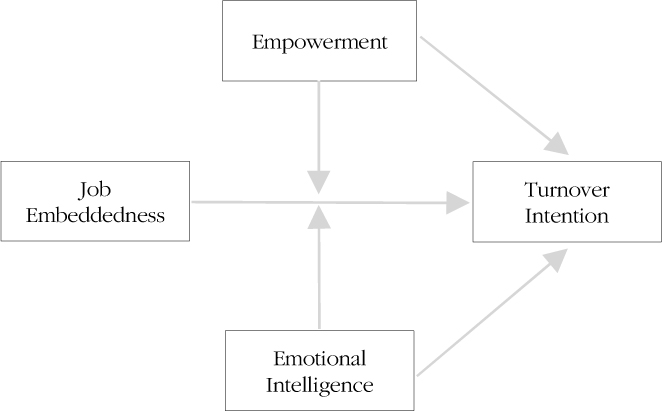J Korean Acad Nurs Adm.
2014 Jun;20(3):302-312.
Roles of Empowerment and Emotional Intelligence in the Relationship between Job Embeddedness and Turnover Intension among General Hospital Nurses
- Affiliations
-
- 1Graduate School, Chung-Ang University, Korea.
- 2Red Cross College of Nursing, Chung-Ang University, Korea. yhyom@cau.ac.kr
Abstract
- PURPOSE
The purpose of this study was to identify the roles of empowerment and emotional intelligence in the relationship between job embeddedness and turnover intension among general hospital nurses.
METHODS
The sample for this study consisted of 224 nurses from four general hospitals of less than 500 beds located in Seoul and Gyunggi Province. Data were analyzed using frequency, percentage, mean, standard deviation, t-test, ANOVA, Scheffe test, Pearson Correlation and Hierarchical Multiple Regression.
RESULTS
It was found that: (a) Job embeddedness and emotional intelligence had negative effects on turnover intension; (b) Emotional intelligence moderated the relationship between job embeddedness and turnover intension, but empowerment did not.
CONCLUSION
Findings indicate a need to reduce the degree of turnover by enhancing job embeddedness among general hospital nurses. Further research needs to be done to refine this study.
Figure
Reference
-
1. Cae KS, No WJ, Park MM, Jeung EJ, Jo OO. Survey on the status of hospital nursing staffing. Hospital Nurses Association;2013.2. Do ES, Kim MY. Comparison of internal marketing, job satisfaction and customer orientation of nurses by size of medical care institution: small-medium hospitals and general hospitals. J Korean Acad Nurs Adm. 2012; 18(1):56–66. http://dx.doi.org/10.11111/jkana.2012.18.1.56.3. Kim YM, Kang YS. The relationship among career plateau, self-efficacy, job embeddedness and turnover intention of nurses in small and medium sized hospitals. J Korea Acad Ind Coop Soc. 2013; 14(10):5078–5090. http://dx.doi.org/10.5762/KAIS.2013.14.10.5078.4. Maertz CP, Campion MA. Turnover. Int Rev Ind Organ Psychol. 1998; 13:49–82.5. Mitchell TR, Holtom BC, Lee TW, Sablynski CJ, Erez M. Why people stay: using job embeddedness to predict voluntary turnover. Acad Manag J. 2001; 44(6):1102–1121. http://dx.doi.org/10.2307/3069391.6. Kang MS, Kang YS. Empowerment moderating effect between job embeddedness and intention to transfer in service industry employee. J Bus Educ. 2011; 25(3):195–214.7. Kim JH. The effects of job embeddedness on turnover intention and organizational citizenship behavior in hospital employee: focusing on moderating effect of personality traits [dissertation]. Busan: Kyungsung University;2009. 52–53.8. Sung HN, Cho DH. The relationship of job embeddedness and turnover intention: focused on the mediating effect of job satisfaction in the construction IT industry. Daehan Acad Manag Inf Syst. 2013; 32(2):339–357.9. Ko JS. A study on the moderating effect of emotional intelligence and turnover intention by job embeddedness. J Ind Econ Bus. 2012; 25(2):1789–1810.10. Kim EH, Lee EJ, Choi HJ. Mediation effect of organizational citizenship behavior between job embeddedness and turnover intension in hospital nurses. J Korean Acad Nurs Adm. 2012; 18(4):394–401. http://dx.doi.org/10.11111/jkana.2012.18.4.394.11. Yom YH, Choi KS. The effects of psychological empowerment and transformational leadership on organizational commitment among hospital nurses. J Korean Acad Nurs Adm. 2005; 11(3):315–322.12. Park SM, Park OO, Moon H. The effect of emotional intelligence in the relationship between emotional labor and turnover intention to the general hospital nurses. Health Soc Welf Rev. 2013; 33(3):540–564.13. Baik DW, Yom YH. Effects of social support and emotional intelligence in the relationship between emotional labor and burnout among clinical nurses. J Korean Acad Nurs Adm. 2012; 18(3):271–280. http://dx.doi.org/jkana.2012.18.3.271.14. Conger JA, Kanungo RN. The empowerment process: Integrating theory and practice. Acad Manag Rev. 1988; 13(3):471–482. http://dx.doi.org/10.2307/258093.15. Oh EH, Chung BY. The effect of empowerment on nursing performance, job satisfaction, organizational commitment, and turnover intention in hospital nurses. J Korean Acad Nurs Adm. 2011; 17(4):391–401. http://dx.doi.org/10.11111/jkana.2011.17.4.391.16. Freshwater D, Stickley T. The heart of the art: Emotional intelligence in nurse education. Nurs Inq. 2004; 11(2):91–98. http://dx.doi.org/10.1111/j.1440-1800.2004.0018.x.17. Han SJ. Influence of clinical nurses' emotional intelligence on their career commitment and turnover intention: moderating role of career commitment. J Korea Contents Assoc. 2011; 11(7):418–425. http://dx.doi.org/jkca.2011.11.7.418.18. Mobley WH, Fisk MJ. Employee turnover, causes, consequences, and control. Reading, MA: Addison-Wesley;1982.19. De Gieter S, Joeri H, Roland P. Revisiting the impact of job satisfaction and organizational commitment on nurse turnover intention: An individual differences analysis. Int J Nurs Stud. 2011; 48(12):1562–1569. http://dx.doi.org/10.1016/j.ijnurstu.2011.06.007.20. Gormley DK, Kennerly S. Predictors of turnover intention in nurse faculty. J Nurs Educ. 2011; 50(4):190–196. http://dx.doi.org/10.3928/01484834-20110214-05.21. Kwon JO, Kim EY. Impact of unit-level nurse practice environment on nurse turnover intention in the small and medium sized hospitals. J Korean Acad Nurs Adm. 2012; 18(4):414–423. http://dx.doi.org/10.11111/jkana.2012.18.4.414.22. Price JL. The study of turnover. 1st ed. Iowa State University Press Ames;1977.23. Price JL, Mueller CW. Absenteeism and turnover of hospital employees. 5rd ed. Greenwich, Conn: JAI Press;1986.24. Jöreskog KG, Sörbom D. LISREL 7: A guide to the program and applications. SPSS Chicago III;1989.25. Blunch N. Introduction to structural equation modeling using SPSS and AMOS. Sage;2008. http://dx.doi.org/10.4135/978144624935.26. Spreitzer GM. Psychological empowerment in the workplace: dimensions, measurement, and validation. Acad Manag J. 1995; 38(5):1442–1465. http://dx.doi.org/10.2307/256865.27. Moon SJ. Structural model of nurses' intentions of changing workplaces [dissertation]. Seoul: Kyunghee University;2010. 31–33.28. Akerjordet K, Severinsson E. Emotional intelligence in mental health nurses talking about practice. Int J Ment Health Nurs. 2004; 13(3):164–170. http://dx.doi.org/10.1111/j.1440-0979.2004.0328.x.29. Wong C, Law KS. The effects of leader and follower emotional intelligence on performance and attitude: An exploratory study. Leadersh Q. 2002; 13(3):243–274. http://dx.doi.org/10.1016/s1048-9843(02)00099-1.30. Lim JS. Research on the relationship between emotional intelligence of employees, Attitudes of employee and behavior[master's thesis]. Seoul: Korea University;2004. 48–50.
- Full Text Links
- Actions
-
Cited
- CITED
-
- Close
- Share
- Similar articles
-
- Structural Relationships among Job Embeddedness, Emotional Intelligence, Social Support and Turnover Intention of Nurses
- Relationship of Job Stress to Turnover Intention in Hospital Nurses of Rural Areas: Job Embeddedness as a Mediator
- Effect of Job Embeddedness on Turnover Intention of Nurses in Long Term Care Hospitals: The Mediating Effect of Nursing Work Environment
- The Relationship of Emotional Labor, Empowerment, Job Burnout and Turnover Intention of Clinical Nurses
- Relationships among Nursing Work Environment, Job Embeddedness, and Turnover Intention in Nurses


